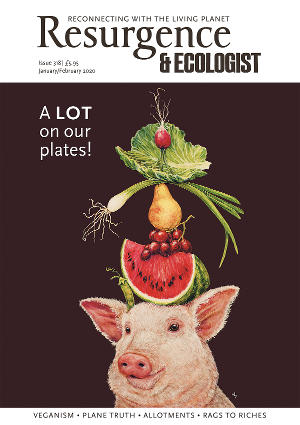Sixty pages into We Are the Weather, Jonathan Safran Foer reveals the subject matter of his book as if it were a plot twist: “This is a book about the impacts of animal agriculture on the environment,” he announces with a flourish – having hitherto masked his core argument, for fear that it is a “losing hand”. It’s not clear why Foer thinks this is a contrarian position, especially since he has already written a book about the realities of industrialised farming. In the decade since, the idea of eating less meat and dairy for the sake of the planet has become relatively commonplace. On the surface, this book does little more than underscore that simple point: intensified animal agriculture is a driving cause of climate change.
How does the author spin this out over 200 pages? By being Jonathan Safran Foer: entering into deeply stylistic divergences via suicide, Jewish history and even an extended philosophical dialogue with his own soul. Through this, the specific call to eat fewer animal products is revealed as a bit of a red herring. Instead, the real purpose of the book is to reassert the power of individual action. “Although it may be a neoliberal myth that individual decisions have ultimate power,’’ he says, “it is a defeatist myth that individual decisions have no power at all.”
Foer peppers the book with examples of how the structural and the exceptional must necessarily be supported by the individual and the mundane, such as ordinary Americans turning their lights off at night during the second world war. He does a good job of bridging the false dichotomy of structural action versus individual action, which has dogged the climate debate over the last few years. Yes, it is true that just 100 companies are responsible for 71% of greenhouse-gas emissions. No, this is not justification for living as carbon-intensively as you wish. His case is compelling, making the call to action deeply ethical as well as pragmatic. Most importantly of all, as far as individual actions go, encouraging people to reduce their consumption of animal products is one of the most genuinely impactful things you can do rather than recycling, or changing your light bulbs. Indeed, it is in no small part thanks to Foer’s book Eating Animals that I am vegan.
Still, it’s hard to shake the thought that Foer is letting fossil-fuel companies off the hook and marginalising the central role collective action, structural solutions and political responses must necessarily play in curbing climate breakdown. Towards the end of the book, he blithely claims, “ExxonMobil sells what we choose to buy,” implicitly putting blame on ordinary people who fill their cars with petrol. I don’t think it’s entirely fair to frame this as a ‘choice’, especially when Foer acknowledges Big Oil’s history of obscuring climate science and locking in dependency on fossil fuels. Key to this line of argument is that demand for fossil fuels and cheap meat begets supply. This is at best only partly true, and it ignores structural forces like marketing, availability, subsidies, lobbying and legislation, which set the parameters of our ‘choices’. While each of us does have power (not to mention ethical obligations), such structural forces ultimately demand a structural solution.






